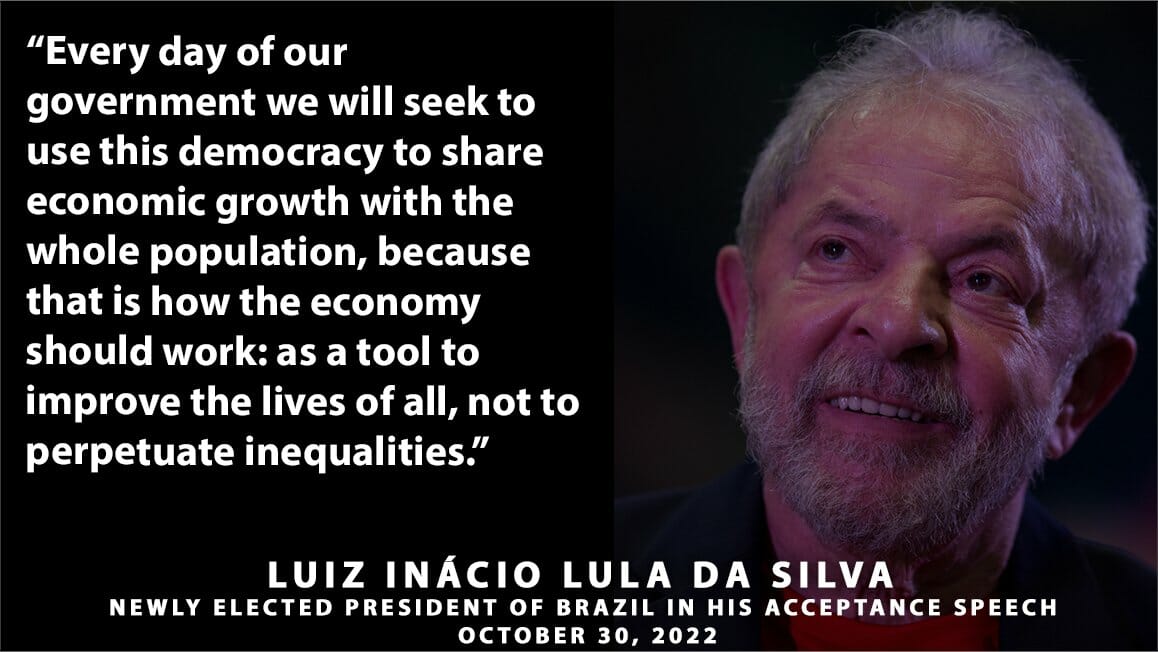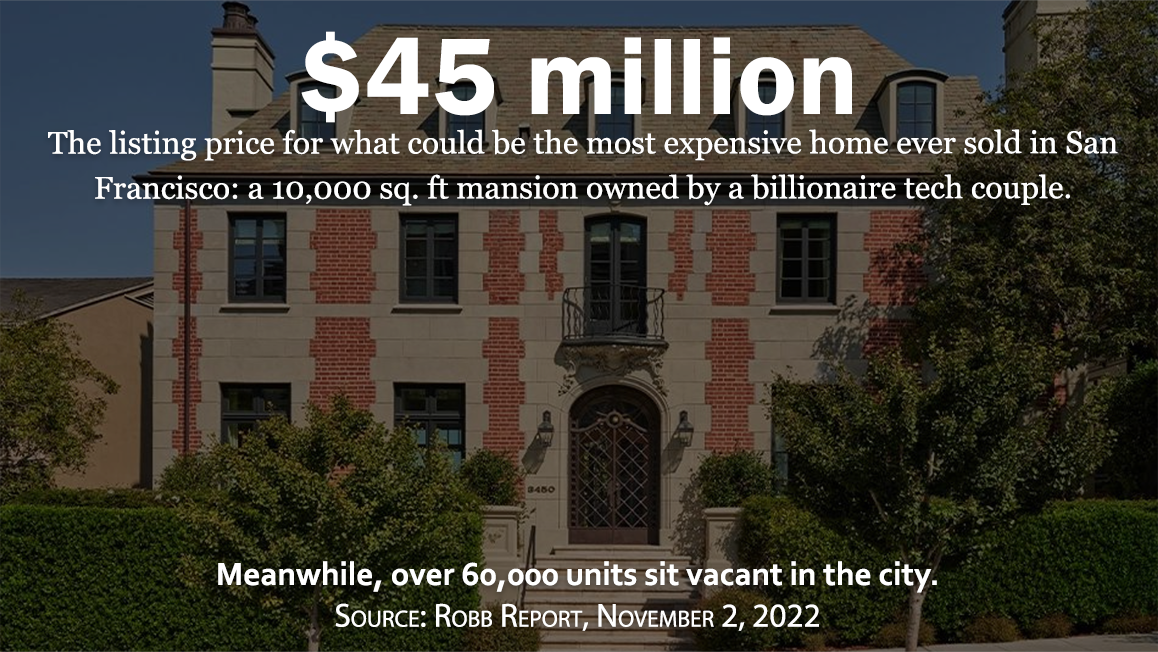| THIS WEEK |
By this time tomorrow, millions of average Americans will be casting votes they hope will decide the future of our nation. A tiny number of other Americans have already voted — with their fortunes.
As of last month, notes a new analysis from Americans For Tax Fairness, 465 U.S. billionaires had pumped $881 million into the 2022 federal midterms. And that total doesn’t even include untraceable “dark money” contributions or donations made during the campaign’s final days. By this election cycle’s end, OpenSecrets reports, billionaire campaign dollars could top $16.7 billion.
The wealthy and powerful, we always need to remember, don’t spend exorbitant amounts on political donations because they share a passionate personal commitment to the democratic political process. They spend lavishly because they expect a real return on their investment — at the expense of the rest of us.
The latest Americans For Tax Fairness campaign-cash figures serve as still another vivid reminder of why we so need to tax both the income and the wealth of the rich at significantly higher levels. In the meantime, our best offense remains, as the saying goes, a good defense. And our best defense against the wealthy and powerful remains our vote. Cast yours wisely!
Chuck Collins and Rebekah Entralgo,
for the Institute for Policy Studies Inequality.org team |
|
| |
|
| INEQUALITY BY THE NUMBERS |
 |
|
|
|
| |
|
| FACES ON THE FRONTLINES |
 |
| Railroad Workers Fighting for On-the-Job Dignity |
In late October, the Brotherhood of Railroad Signalmen became the second union to reject a tentative agreement with the major U.S. freight railroads, setting up the possibility for a nationwide strike later this month.
The tentative agreement does includes pay raises. But this pact ignores what most concerns many railroad workers: quality of life. Railroad execs have refused to ease their strict policies that force workers to be on call 24/7. Rail workers have zero sick days. But as it turns out, guaranteeing 15 paid sick days to rail workers would cost the industry a grand total of $688 million a year – that’s less than 3.5 percent of its annual profits.
“In the middle of a contract dispute that could bring the nation to a halt,” notes Ron Kaminkow, an Amtrak engineer and Railroad Workers United’s general secretary, railroad execs “cannot provide us with a few days of sick time” while they continue to rake in “record profits year after year.”
For more, watch this discussion with Kaminkow and other rail workers.
|
|
| |
|
| WORDS OF WISDOM |
 |
|
|
|
| |
|
PETULANT PLUTOCRAT
OF THE WEEK |
 |
| This UK Political Pooh-Bah Has Wall Street Secrets |
| Most politicians like to crow about their real-world “business” experience. Rishi Sunak, the latest Conservative Party UK prime minister, is keeping his under wraps. Sunak, note investigative journalists Pam and Russ Martens, “has scrubbed his Goldman Sachs and hedge fund career” from both his LinkedIn profile and official government bio. The new British PM turns out to have been directly involved with the TCI hedge fund’s secret moves to gain a sizeable stake in the U.S. rail freight giant CSX. A shareholder at CSX ended up suing Sunak’s hedge fund and recovering for her company the $10 million in “short-swing” profits that Sunak’s maneuvering helped materialize, plus some $550,000 in legal fees. But Sunak and his spouse, the daughter of billionaire Infosys co-founder Narayana Murthy, seemed to have survived the CSX nastiness quite nicely. CNBC puts the Sunak household’s current net worth at $844 million, about double the fortune that belongs to King Charles. |
|
| |
|
| BOLD SOLUTIONS |
 |
| The USA Can’t Afford Not to Have a Wealth Tax |
Ah, the fabled “wealth tax,” a bogeyman for defenders of our deeply unequal status quo and an untapped resource for the rest of us.
Wealth taxation, explains Bridging the Divide author Jack Metzgar, “could solve a lot of problems and fund a lot of common good, even if that tax only somewhat reduced our savage economic inequality.” The revenue from just a 1 percent wealth tax on the 1 percent — $500 billion per year — could cut child poverty by more than half.
The Washington Post’s editorial board continues to misrepresent existing federal wealth tax proposals, in the interest of the paper’s centi-billionaire owner, as our Bob Lord notes. But millions of Americans have a shot tomorrow, at the ballot box, to weigh in on taxing the rich. Their votes would be transformative.
The Massachusetts Fair Share Amendment, writes our Omar Ocampo, would improve public transit and education by levying a 4 percent surtax on residents earning incomes of $1 million or more. And Californians will consider Proposition 30, which would tax incomes over $2 million by an additional 1.75 percent. By approving the measure, CNBC’s Kate Dore reports, the Golden State could generate $3.5 billion to $5 billion in annual revenue for zero-emissions vehicle programs and wildfire response and prevention.
Taxes on the wealth of the wealthy could someday bring in far more. Jack Metzgar has more details below. |
|
| |
|
| GREED AT A GLANCE |
 |
|
|
|
| |
|
| TOO MUCH |
 |
| Without Equality, Our Environment Has No Shot |
| Great thinkers, down through the ages, have regularly had to watch the movers and shakers of their epochs shrug off their core insights. One of our contemporary great thinkers who suffered that fate — the 84-year-old economist Herman Daly — died late last month. Daly did not, to be sure, go totally unrecognized during his lifetime. In 1996, he won the “alternate Nobel Prize,” Sweden’s annual Right Livelihood Award. But Daly’s death has, by and large, gone unnoticed. No obit has so far appeared in any major mass media publication. Still, despite this media disinterest, Daly most certainly does figure to get much more attention in the years ahead. Why? The life’s work of this University of Maryland emeritus professor just happens to directly link the two supreme challenges of our time: environmental collapse and economic inequality. Inequality.org’s Sam Pizzigati has more. |
|
| |
|
| MUST READS |
|
What's on Inequality.org
Bella DeVaan, San Francisco Confronts Inequality at the Ballot Box. The Bay Area is home to some of America’s most frightening inequalities. But ballot measures supporting affordable housing, free college, and voter turnout offer a promising political horizon.
Rebekah Entralgo, In One Maine City, Solutions to the Affordability Crisis Are on the Ballot. Victory for the Livable Portland campaign this Election Day will demonstrate the power of local organizing as the federal government remains gridlocked.
Bob Lord, Why Do Billionaires So Love Owning Newspapers? You never know when an editorial can come in handy. Just ask Jeff Bezos.
Elsewhere on the Web
Rev. William Barber and Karen Dolan, These midterm elections have enormous stakes for poor and low-income Americans, Guardian. The GOP “Commitment to America” promises — at the expense of low-income families — still more tax cuts for corporations and the extremely wealthy.
Jonathan Weisman and Rachel Shorey, Fueled by Billionaires, Political Spending Shatters Records Again, New York Times. The top 1 percent of donors, measured by income, has given 38 percent of the total.
Yvonne Abraham, The face of opposition to Question 1 admits proposed tax wouldn’t hurt him much: ‘I’m not struggling,’ Boston Globe. Ads against a tax-the-rich ballot proposition in Massachusetts showcase a “gray-bearded 66-year-old, in suspenders and dirty jeans” decrying the measure’s “punishing” impact on “years of hard work.” This dirty-jeans guy turns out to be worth multiple millions.
Senator Bernie Sanders, Our economic crisis isn’t inflation, it’s corporate greed and the GOP will only make that worse, Fox News. Our four biggest oil giants are spending over $73 billion not to reduce gas prices at the pump but to buy back their own stock and increase dividends to their wealthy stockholders.
Bernie Gallagher, Arizona Ballot Measure Part of Larger Push to Erode Democracy, Hamstring State Revenues, Center on Budget and Policy Priorities. Taxing the rich in Arizona — through ballot initiatives — will get next to impossible if Prop 132 wins on Election Day and requires ballot measures to get 60 percent of the vote to become law.
Fatema Sumar, Why inequality is growing in the US and around the world, The Conversation. In every major region of the world outside of Europe, extreme wealth is becoming concentrated in just a handful of pockets.
Siva Vaidhyanathan, Like Trump, Elon Musk reveals a vapid mind super-charged by wealth and ego, Guardian. Musk subscribes to a philosophy that exhibits complete faith in the ability of technological and financial elites like Musk himself to re-engineer humanity.
Michael Roberts, Denmark: the happy social democrat model? Growing Danish inequality, notes this leading progressive economist's blog, shows the move to the right by Nordic Social Democrats over recent decades has led to accelerating reductions in the formerly famous welfare state model.
Rachel Cooke, The White Lotus and the horror of the super-rich, New Statesman. Mike White’s satire-come-murder-mystery zeroes in on the unhappiness of the too-rich, with no thread count ever high enough.
|
|
| |
|
| A FINAL FIGURE |
 |
|
|
|
| |
|
| BE THE 1% (NO, NOT THAT 1%) |
 |
Our goal for 2022: that 1% of our Inequality.org subscribers become monthly sustainers and help grow our newsletter and research efforts. Be the 1%, for as little as $3 a month! |
|
|
|
| |
|
|